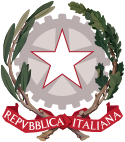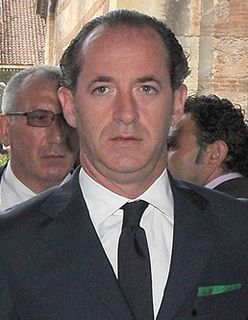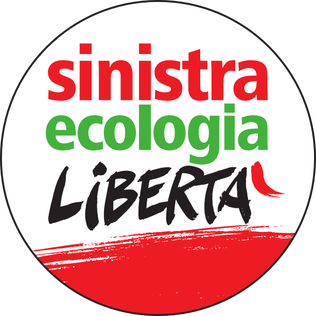 |
|---|
| This article is part of a series on the politics and government of Italy |
| Constitution |
|
| Foreign relations |
Related topics |
Three referendums on reforming the electoral law were held in Italy on 21–22 June 2009. They were promoted by Mario Segni, Giovanni Guzzetta, Arturo Parisi, Antonio Martino and Daniele Capezzone. With a turnout of 23.31% / 23.84%, the referendums did not reach the necessary quorum of 50% voters, so were not valid. [1]

Italy, officially the Italian Republic, is a country in Southern Europe. Located in the middle of the Mediterranean Sea, Italy shares open land borders with France, Switzerland, Austria, Slovenia and the enclaved microstates San Marino and Vatican City. Italy covers an area of 301,340 km2 (116,350 sq mi) and has a largely temperate seasonal and Mediterranean climate. With around 61 million inhabitants, it is the fourth-most populous EU member state and the most populous country in Southern Europe.

Mariotto Segni, more often known as Mario, is an Italian politician and professor of civil law. He is also the son of the politician Antonio Segni, one time President of the Republic of Italy.

Arturo Parisi is an Italian politician, leader of the Ulivist faction of the Democratic Party and four-time member of the Italian Chamber of Deputies. He was also minister of defence in the cabinet of Prime Minister Romano Prodi from 2006 to 2008.
Contents
The three questions [2] were about giving the majority prize to the most voted list in the Chamber of Deputies (question 1, purple ballot) and in the Senate (question 2, yellow ballot) as opposed to the most voted coalition, as is the current law, and about preventing politicians from standing in multiple constituencies at the same time (question 3, green ballot). [3]
The Promoting Committee and Democratic Party (PD) had proposed holding the referendums together with European Parliament elections, whereas The People of Freedom (PdL) as its main ally, the Lega Nord, opposed the referendums and answered that never, in Italian history, an election and a referendum were jointly celebrated.

The Democratic Party is a social-democratic political party in Italy. The party's secretary is Nicola Zingaretti, who was elected in March 2019, while Paolo Gentiloni serves as president.

The People of Freedom was a centre-right political party in Italy.

Lega Nord, whose complete name is Lega Nord per l'Indipendenza della Padania, is a right-wing regionalist political party in Italy. In the run-up of the 2018 general election, the party was rebranded as Lega (League) without changing its official name in the party's statute. The party was nonetheless frequently referred to only as "Lega" even before the rebranding. The LN is also often referred to as Carroccio by the Italian media.
Several PdL party officials had long supported the referendums, the main long-term goal of the PdL being to transform Italian politics into a two-party system. The PD saw the referendums as an opportunity to overcome its current political hard times and to divide the centre-right. [4] [5] [6]
A two-party system is a party system where two major political parties dominate the government. One of the two parties typically holds a majority in the legislature and is usually referred to as the majority or governing party while the other is the minority or opposition party. Around the world, the term has different senses. For example, in the United States, Jamaica, and Malta, the sense of two-party system describes an arrangement in which all or nearly all elected officials belong to one of the only two major parties, and third parties rarely win any seats in the legislature. In such arrangements, two-party systems are thought to result from various factors like winner-takes-all election rules. In such systems, while chances for third-party candidates winning election to major national office are remote, it is possible for groups within the larger parties, or in opposition to one or both of them, to exert influence on the two major parties. In contrast, in the United Kingdom and Australia and in other parliamentary systems and elsewhere, the term two-party system is sometimes used to indicate an arrangement in which two major parties dominate elections but in which there are viable third parties which do win seats in the legislature, and in which the two major parties exert proportionately greater influence than their percentage of votes would suggest.













